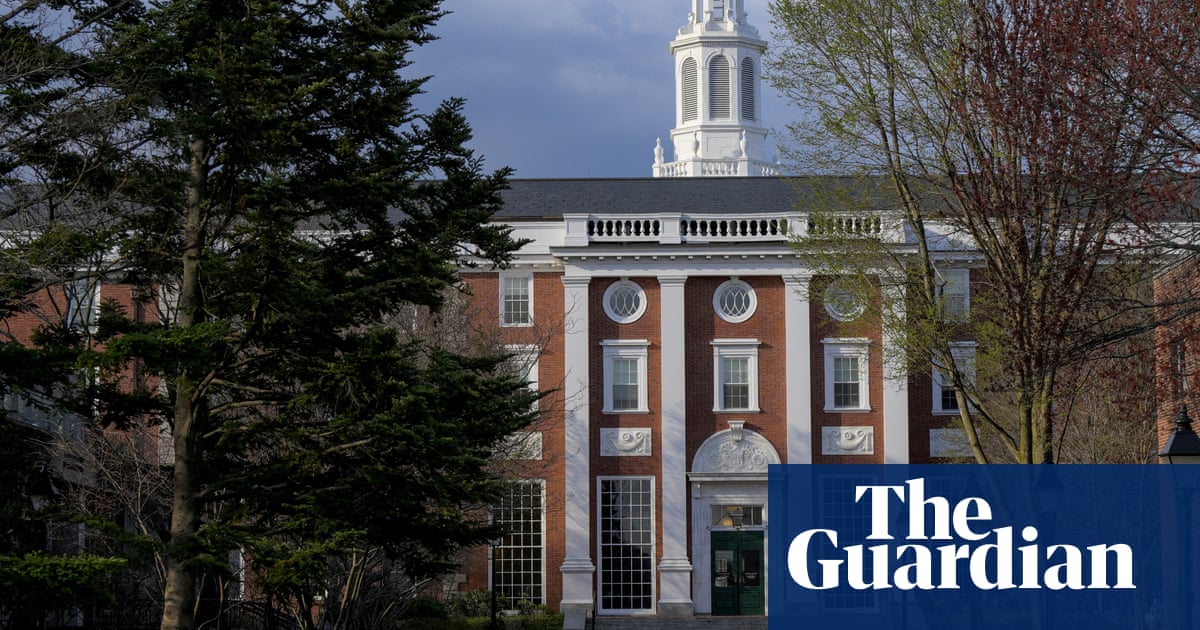Harvard Universityon Friday sued the Trump administration over itsabrupt banthe day before on enrolling foreign students.
Meanwhile, theTrump administrationhas accused Columbia University of violating civil rights laws, while overseas governments had expressed alarm at the administration’s actions against Harvard as part of itslatest assaulton elite higher education in the US.
Harvard University announced on Friday morning that it was challenging the Trump administration’s decision to bar the Ivy League school from enrolling foreign students, calling it unconstitutional retaliation for the school previously defying the White House’s political demands.
In a lawsuit filed in federal court in Boston, Harvard said the government’s action violates the first amendment of the US constitution and will have an “immediate and devastating effect for Harvard and more than 7,000 visa holders”.
“With the stroke of a pen, the government has sought to erase a quarter of Harvard’s student body, international students who contribute significantly to the university and its mission,” Harvard said in its suit. The institution added that it plans to file for a temporary restraining order to block the Department of Homeland Security from carrying out the move.Harvard enrolls almost 6,800 foreign students at its campus in Cambridge, Massachusetts. Most are graduate students and they come from more than 100 countries.
Meanwhile, the Department of Health and Human Services (HHS) Office for Civil Rights late on ThursdaycitedColumbia University, claiming the New York university acted with “deliberate indifference towards student-on-student harassment of Jewish students from October 7, 2023, through the present”, markingthe datewhenHamasled the deadly attack on Israel out of Gaza that sparked a ferociousmilitary responsefrom the Jewish state, promptingprolongedpro-Palestinian protests on US streets andcollege campuses.
“The findings carefully document the hostile environment Jewish students at Columbia University have had to endure for over 19 months, disrupting their education, safety, and well-being,” said Anthony Archeval, acting director of the office for civil rights at HHS, in a statement on the action.
It continued: “We encourage Columbia University to work with us to come to an agreement that reflects meaningful changes that will truly protect Jewish students.” Columbia University had not yet issued a statement on the citation early on Friday morning.
Orders by the Trump administration earlier this month to investigate pro-Palestine protesters at Columbia University raised alarms within the Department of Justice, the New York Timesreported. A federal judgedenieda search warrant for the investigation and ordered the Trump administration to include a transcript of the sealed discussions over their warrant application if they attempted to refile the search warrant application in another federal court.
Earlier this year, Columbia Universityagreedto a list of demands from the Trump administration in response to $400m worth of grants and federal funds to the university being cancelled over claims of inaction by the university to protect Jewish students.
The dramatic developments at Harvard came a week before many students at Harvard are set to graduate and while students from Columbia have been in a week of graduation celebrations.
The Harvard Crimson student newspaperreportedthat the Department of Homeland Security (DHS) gave Harvard 72 hours to turn over all documents on all international students’ disciplinary records and paper, audio, or video records on protest activity over the past five years in order to have the “opportunity” to have its eligibility to enroll foreign students reinstated.
Sign up toThis Week in Trumpland
A deep dive into the policies, controversies and oddities surrounding the Trump administration
after newsletter promotion
“The government’s action is unlawful,” said astatementfrom Harvard on the action. “This retaliatory action threatens serious harm to the Harvard community and our country, and undermines Harvard’s academic and research mission.”
Prior to Harvard filing suit, the Chinese government early on Friday hadsaidthe move to block foreign students from the school and oblige current ones to leave would only hurt the international standing of the US. The Hong Kong University of Science and Technology extended an open invitation to Harvard international students and those accepted in response to the action against Harvard.
Former German health minister and alumnus of Harvard Karl Lauterbachcalledthe action against Harvard “research policy suicide”. Germany’s research minister Dorothee Baer had also, before Harvard sued, urged the Trump administration to reverse its decision,callingit “fatal”.
The Associated Press contributed reporting.
